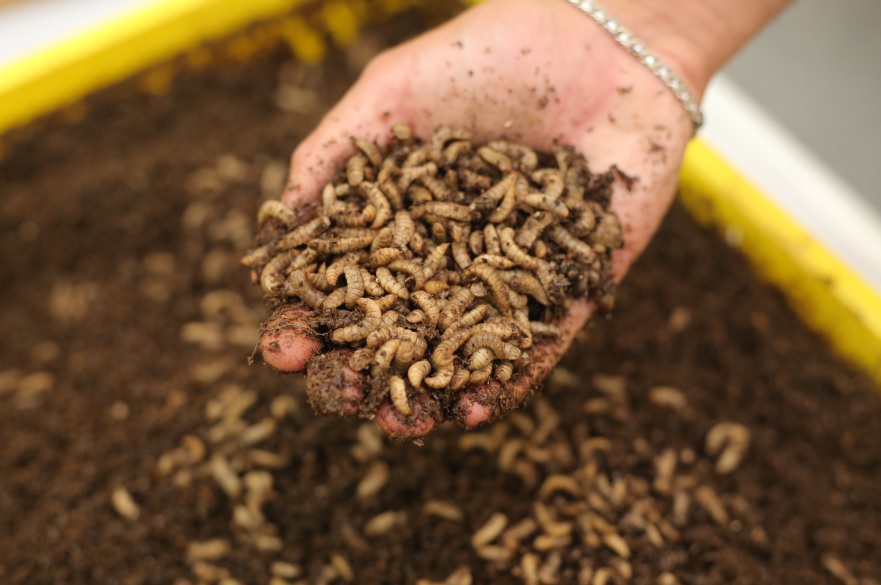Nutritionally-enhanced insects could biofortify poultry feed with essential vitamins and minerals
Fly larvae will be fed food waste nutritionally-enhanced using nanometre (one billionth of a meter) sized natural minerals before being added to poultry feed.
By Dave Rogers | Published on 17 October 2023
Categories: Press office; Research; School of Animal, Rural and Environmental Sciences; School of Science and Technology;

It is part of a feasibility study led by scientists at Nottingham Trent University and agri-tech company Flybox, which aims to increase the nutritional value of chickens and significantly reduce the carbon footprint of ingredients.
The research will involve biofortifying black soldier fly larvae with essential minerals for nutrition such as zinc, iron, calcium and selenium.
As part of the two year £1m project – funded by UK Research and Innovation’s Biotechnology and Biological Sciences Research Council and Innovate UK – the larvae will then be added to grain for poultry before the research team evaluates the nutritional uptake in the birds.
It is expected that the approach would improve the nutritional value to consumers, as well as enhance the health and wellbeing of the birds.
Currently, farmed poultry diet is supplemented with protein such as soybean oil, but a worldwide protein shortage means this component in animal feed is increasingly financially and environmentally unstable and a pressing global issue.
The price of chicken feed has increased by half in the last two years and demand is expected to double by 2050.
It has been reported that animal feed makes up almost 80% of chickens’ carbon footprint, which comes from shipping the feed around the world – soybean protein for instance comes primarily from Latin America.
The Nottingham researchers argue that the study will enable the adoption of an alternative, hyper-local, low emission protein solution, by lowering cost of production while adding value to feed for poultry and other livestock.
The project, which involves researchers from Nottingham Trent University’s School of Science and Technology and School of Animal, Rural and Environmental Sciences, will include the installation of a Flybox modular insect farm on the university’s Brackenhurst Campus.
This would be used for feeding the black soldier fly larvae with the food waste and nanomaterial.
The researchers will develop a nano-enhanced substrate with naturally occurring minerals and amino acids essential for poultry health. Elements are combined together at an atomic scale until they uniformly grow into a nanometre size. By utilising the minerals at this size the birds – and insects – can use and metabolise them more effectively.
Black fly soldier larvae meal is already being produced at a moderate-industrial scale, however, in the UK and Europe the use of insect meal is currently largely restricted to high profit margin niches in the petfood industry.
The researchers argue it is not reaching its full potential to be a sustainable and low-emission protein source for the livestock industry.
“We are circumventing having to use all the supplements currently required, which are expensive, in short supply and not environmentally-sustainable,” said Dr Gareth Cave, a researcher in Nottingham Trent University’s School of Science and Technology.
He said: “The insects are essentially loaded with nutrition from waste food products and this then becomes part of a natural diet for the poultry. Importantly, this is a hyper-local, circular and low-carbon way to address a serious challenge in the animal feed sector.”
Emily Burton, Professor in Sustainable Food Production in the university’s School of Animal, Rural and Environmental Sciences, said: “We see insect larvae as the key to circularising food production, so it is great to support a project aiming to optimise the production and use as poultry feed.”
Andrea Jagodic, Co-Founder & CEO of Flybox, said: “This is an exciting route to positively influence unit economics for the entire insect protein industry. It is the right time to start integrating a precision agriculture approach when integrating insect meal into commercial feed. We look forward to collaborating with Nottingham Trent University to further unlock the potential of insect protein.”
Notes for Editors
Press enquiries please contact Dave Rogers, Public Relations Manager, on telephone +44 (0)115 848 8782, or via email.
Nottingham Trent University (NTU) received the Queen’s Anniversary Prize for Higher and Further Education in 2021 for cultural heritage science research. It is the second time that NTU has been bestowed the honour of receiving a Queen’s Anniversary Prize for its research, the first being in 2015 for leading-edge research on the safety and security of global citizens.
The Research Excellence Framework (2021) classed 83% of NTU’s research activity as either world-leading or internationally excellent. 86% of NTU’s research impact was assessed to be either world-leading or internationally excellent.
NTU was awarded The Times and The Sunday Times Modern University of the Year 2023 and ranked University of the Year in the Whatuni Student Choice Awards 2023. It was awarded Outstanding Support for Students 2020 (Times Higher Education Awards), University of the Year 2019 (Guardian University Awards, UK Social Mobility Awards), Modern University of the Year 2018 (Times and Sunday Times Good University Guide) and University of the Year 2017 (Times Higher Education Awards).
NTU is the 5th largest UK institution by student numbers, with approximately 40,000 students and more than 4,400 staff located across five campuses. It has an international student population of 7,000 and an NTU community representing over 160 countries.
Since 2000, NTU has invested £570 million in tools, technology, buildings and facilities.
NTU is in the UK’s top 10 for number of applications and ranked first for accepted offers (2021 UCAS UG acceptance data). It is also among the UK’s top five recruiters of students from disadvantaged backgrounds and was the first UK university to sign the Social Mobility Pledge.
NTU is ranked the second most sustainable university in the world in the 2022 UI Green Metric University World Rankings (out of more than 900 participating universities).